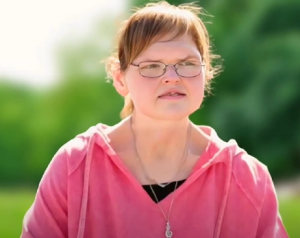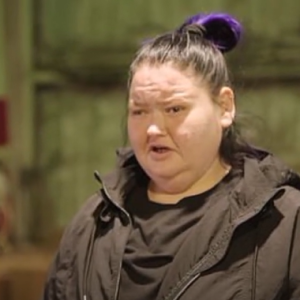In the hush after a life-changing loss, the details of Caleb Willingham’s death linger like smoke in a burned room: startling in their bluntness, intimate in their impact, and loaded with questions that insist on more than just a clinical explanation. Caleb, who shared a doorway into a world many fans felt they knew through Tammy Slaton’s journey, died at the age of 40, a figure whose passing sent ripples across Kentucky, Ohio, and the dedicated TLC audience that followed their love story from the hospital ward to the wedding aisle and beyond. The autopsy would later attribute his death to natural causes connected to complications of super morbid obesity, a phrase that reads like a medical shorthand for a life lived under extraordinary physical strain. Yet to stop at that line would be to overlook the human heart that beat behind it—the man who stood by Tammy in a hallway that many viewers remember as a turning point, the partner who whispered “us” into a future that they hoped could be built together, even when the odds seemed stacked high against them. Caleb’s passing isn’t simply a statistic on a page or a line in a recap; it is a moment that reframes the couple’s story from televised spectacle to lived experience, underscoring the reality that obesity is not merely a number but a complex medical condition that intersects with trauma, access to care, and the intimate rituals of everyday life.
From the moment Tammy and Caleb appeared on screen as a newly minted couple walking hand in hand toward a future that felt both precarious and luminous, their relationship offered a different lens on the weight-loss narrative that dominates popular culture. They met in a rehabilitation context, their bond forged through shared battles with gravity and breath, a connection that felt earned rather than manufactured. Their engagement in October 2022 and a late-2022 wedding inside the Windsor Lane Rehabilitation Center in Gibson, Ohio, transformed a hospital corridor into a ceremony space and a life together into a living testament to resilience. The world watched as Tammy, already navigating treatment and the emotional turbulence that accompanies life-altering medical journeys, found in Caleb a partner who seemed to anchor her in ways that many viewers found profoundly moving. When Caleb passed away in early July 2023, Tammy’s grief was not just personal; it was a public rupture—the moment when a carefully curated television narrative collided with the raw tenderness of loss. The public longing to understand “how did he die?” collided with the equally human need to know who he was, what he meant to Tammy, and why his existence mattered beyond the screen. The public record that emerged on February 9, 2024, clarified the cause, but the deeper, more persistent questions about Caleb’s role in Tammy’s life—how he supported her, how his own health challenges intersected with theirs, and how their love endured through medical crises—remained threaded through every episode, every Instagram post, and every whispered tribute from friends, family, and fans.
What follows is not a reduction of a life to a cause, but a careful attempt to honor a partner’s memory while extending the conversation beyond the sensational headlines. The phrase “complications of super morbid obesity” sits at the intersection of medicine and humanity: it signals a constellation of risks—cardiac strain, respiratory compromise, metabolic stress—while also reminding us that the human story cannot be fully captured by a single diagnosis. The autopsy’s blunt language should be read with care, because within it lies a reality that is all too familiar for many families touched by extreme obesity: a chronic, multifactorial disease that demands comprehensive, compassionate care, early intervention, and systems-level support. Caleb’s death invites a broader public reflection on how society treats obesity, how healthcare navigates the barriers to effective treatment, and how communities rally when a couple’s public life is suddenly stripped of privacy and replaced with sorrow. It is a reminder that grief does not discriminate—the loss of a husband, a partner, a person who shared in a life’s challenges, echoes through kitchens, bedrooms, and hospital waiting rooms long after the cameras stop rolling.
Caleb’s story is inseparable from Tammy’s—two people who found one another in the crucible of struggle, who argued and argued again for a chance at a different life, and who, in some essential way, chose each other over the weight of circumstance. Their relationship was not merely a romance but a partnership in the most practical sense: a daily negotiation of health, hope, and survival. Tammy herself has spoken honestly about the road they walked—how the couple’s fight against gravity and its consequences took its toll, how public attention can both illuminate and intensify private pain, and how love, in the end, required a stubborn, ongoing commitment to care. Caleb’s impact on Tammy’s journey was tangible: a source of encouragement, a colleague in the long rehabilitation process, and a witness to a life that demanded more than passive spectatorship. His absence leaves a void that cannot be filled by reruns, viral clips, or retrospective tributes. It demands, instead, a nuanced look at how two people can grow under pressure, how grief reframes a shared past, and how communities can honor a life by asking better questions about health, support, and the value of every breath.
In the months that followed Caleb’s death, the public narrative shifted from the shock of loss to a more measured, empathetic inquiry: how can we talk about obesity with nuance and without blame? The medical reality—obesity as a chronic, complex disease—invites a broader, more compassionate framework for understanding the kind of life Caleb lived and the challenges Tammy continues to face. This is not about absolving responsibility or excusing pain; it is about acknowledging that health outcomes are shaped by a web of factors—biology, trauma, access to care, environment, and the slow, stubborn work of daily choices. Caleb’s legacy, then, can be found in the way this conversation evolves: a refusal to reduce a couple’s love story to a single tragedy, and a commitment to honoring the memory of a husband by supporting a more informed, humane discourse about obesity and recovery. As Tammy continues to navigate the public gaze, the questions persist, but so too does the recognition that Caleb’s life and death are part of a larger story about resilience, care, and the persistent fight to breathe—and to love—against all odds.





